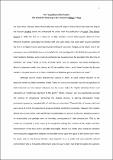Files in this item
The temptation of the reader : the search for meaning in Boris Akunin's Pelagia Trilogy
Item metadata
| dc.contributor.author | Whitehead, Claire Eugenie | |
| dc.date.accessioned | 2018-01-19T00:30:44Z | |
| dc.date.available | 2018-01-19T00:30:44Z | |
| dc.date.issued | 2016-01-01 | |
| dc.identifier | 15508286 | |
| dc.identifier | 04842b8b-d065-4f1b-8818-e37d1e2479ac | |
| dc.identifier | 84962068654 | |
| dc.identifier | 000368252800002 | |
| dc.identifier.citation | Whitehead , C E 2016 , ' The temptation of the reader : the search for meaning in Boris Akunin's Pelagia Trilogy ' , Slavonic and East European Review , vol. 94 , no. 1 , pp. 29-56 . https://doi.org/10.5699/slaveasteurorev2.94.1.0029 | en |
| dc.identifier.issn | 0037-6795 | |
| dc.identifier.other | ORCID: /0000-0003-3712-2223/work/51943784 | |
| dc.identifier.uri | https://hdl.handle.net/10023/12513 | |
| dc.description.abstract | This article discusses the games that Boris Akunin's Pelagia trilogy (2000–03) plays with the reader's attempts at interpretation and meaning-making. Most critics agree that detective fiction in this ‘whodunnit’ mode is a genre that invites the active participation of its reader in order to uncover a hidden truth. What Akunin's trilogy does, however, is simultaneously to invite this participation and playfully frustrate it by thwarting or disrupting the reader's various attempts at solving its puzzles. This article considers the ludic elements of Akunin's trilogy in three different, though related, interpretive spheres: historical reference; intertextual and metatextual reference; and the search for faith. It concludes that the Pelagia trilogy is best viewed as an example of postmodernist metaphysical detective fiction, which poses provocative questions about the nature of knowledge, the status of meaning, as well as the act of reading. | |
| dc.format.extent | 28 | |
| dc.format.extent | 519008 | |
| dc.language.iso | eng | |
| dc.relation.ispartof | Slavonic and East European Review | en |
| dc.rights | © MHRA 2015. This work is made available online in accordance with the publisher’s policies. This is the author created, accepted version manuscript following peer review and may differ slightly from the final published version. Originally published in The Slavonic and East European Review, published by Modern Humanities Research Association. The final published version can be found here: http://www.jstor.org/stable/10.5699/slaveasteurorev2.94.1.0029 | en |
| dc.subject | Novels | en |
| dc.subject | Setting | en |
| dc.subject | Literary criticism | en |
| dc.subject | Narratives | en |
| dc.subject | Narrators | en |
| dc.subject | Intertextuality | en |
| dc.subject | Literary postmodernism | en |
| dc.subject | Caves | en |
| dc.subject | Crime fiction | en |
| dc.subject | Detective fiction | en |
| dc.subject | PG Slavic, Baltic, Albanian languages and literature | en |
| dc.subject | BDC | en |
| dc.subject | R2C | en |
| dc.subject | SDG 16 - Peace, Justice and Strong Institutions | en |
| dc.subject.lcc | PG | en |
| dc.title | The temptation of the reader : the search for meaning in Boris Akunin's Pelagia Trilogy | en |
| dc.type | Journal article | en |
| dc.contributor.institution | University of St Andrews.Russian | en |
| dc.identifier.doi | 10.5699/slaveasteurorev2.94.1.0029 | |
| dc.description.status | Peer reviewed | en |
| dc.date.embargoedUntil | 2018-01-18 |
This item appears in the following Collection(s)
Items in the St Andrews Research Repository are protected by copyright, with all rights reserved, unless otherwise indicated.

